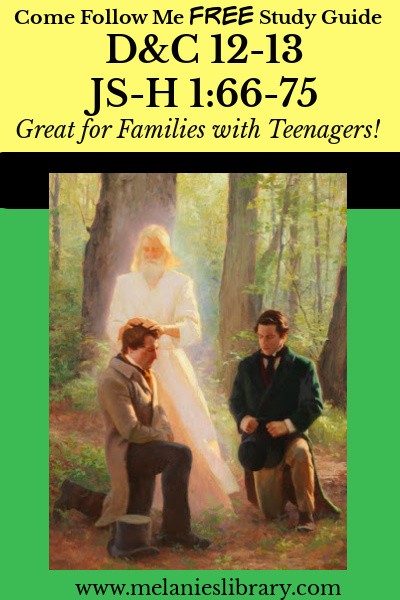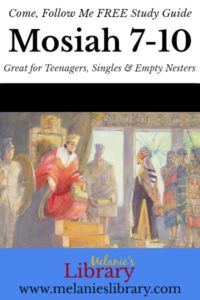Come, Follow Me Daily Study Guide for the week of February 8-14, 2021 covering Doctrine and Covenants 12-13 and Joseph Smith – History 1:66-75. For personal and/or family study of the scriptures, geared towards families with teenagers.

**This is a suggested outline that coincides with the Come, Follow Me manual. There is not just one right way when it comes to studying the scriptures. Everyone should study in a way that is best for them, but I do hope that you find these outlines helpful.
**SCRIPTURE JOURNALS – I highly suggest getting a scripture journal for each person. Many times my outlines will suggest writing something down in your scripture journal. These are also great for writing down any impressions or “Aha” moments that you might have as you study the scriptures. Composition books found at the Dollar Store work great!
**A free PDF DOWNLOAD of the Study Guide is available at the bottom of this post, making it easy for those who’d like to print out a copy. OR you can add Melanie’s Library to your mobile device home screen by following these instructions, click HERE
**SONGS – For a list of suggested songs for each day of the week, be sure and check out the blog called Music for Latter-day Life by clicking HERE
**OPENING SONG SUGGESTION FOR NON-SINGERS – We are not big singers in our family but I know how powerful music can be when it comes to inviting the Spirit. Instead of singing, we have begun listening to the song suggested on Music for Latter-day Life and as we listen we each write in our scripture journals how we have seen the hand of the Lord in our lives or something we are grateful for. It has been a wonderful way to get everyone in the right mindset and to invite the Spirit for our family scripture study.

FHE DAY
Start the week off right with a Family Home Evening that is focused around the upcoming week’s Come, Follow Me. Sign up for the Teach Me FHE email group and receive an FHE outline delivered right to your inbox every Sunday morning. Sign up at the bottom of this post.

THE AARONIC PRIESTHOOD AND PRIESTHOOD KEYS
BACKGROUND
D&C 13 is only one verse but it has tremendous significance. In this section, the Aaronic Priesthood is restored to the earth.
VIDEO: Restoration of the Aaronic Priesthood (1:02), click HERE
SHOW IMAGE:

Image used for educational purposes.
This is a picture of John the Baptist, a resurrected being, who came to earth to confer the Aaronic Priesthood upon Joseph Smith and Oliver Cowdery. “John the Baptist was the last man to hold the keys of the Aaronic Priesthood anciently. A major function of the Aaronic Priesthood is to prepare Israel for the Melchizedek Priesthood. John went before the Savior and prepared the way for Him.” (A Commentary on the Doctrine and Covenants by Robinson and Garrett)
SCRIPTURE
READ: D&C 13 including the section heading
MINI LESSON
ACTIVITY: Below are True or False statements regarding the Aaronic priesthood and priesthood keys. Feel free to use all of them or pick and choose which ones you feel your family would benefit from discussing.
OPTION #1: Go through each statement and answer one by one.
OPTION #2: Read through all of the statements first and ask family members to write down True or False in their scripture journals. Then go back and see how many each person got right, discussing the answers as you go.
15 TRUE OR FALSE STATEMENTS
1.The Priesthood is the power and authority of God.
True. The priesthood is the power and authority of God.
2.The Priesthood of Aaron mentioned in D&C 13 is different from the Aaronic Priesthood.
False. The “Priesthood of Aaron” is what we normally refer to as the “Aaronic Priesthood.” It was named after Aaron, who was Moses’ brother. He and his sons were called upon to officiate as priests in the rites and sacrifices which belonged to the Aaronic Priesthood (see Exodus 28).
3. Joseph Smith and Oliver Cowdery became holders of the Aaronic Priesthood before they became holders of the Melchizedek Priesthood. This is the same for worthy male members of the church today, they hold the Aaronic Priesthood before they hold the Melchizedek Priesthood.
True. The Aaronic Priesthood is also referred to as the preparatory priesthood. (D&C 84:26) President Eyring taught in a Priesthood Session of conference, “Just as the time we have been given to live in mortality is to prepare to meet God, the time we are given to serve in the Aaronic Priesthood is an opportunity to prepare us to learn how to give crucial help to others.” (The Preparatory Priesthood By President Henry B. Eyring)
4. The Aaronic Priesthood consists of 3 important keys.
True. The Aaronic Priesthood holds the keys of the ministering of angels, the gospel of repentance, and baptism. (Refer to D&C 13)
5. The Aaronic Priesthood, being the lesser priesthood, is not that important.
False.
QUOTE BY DALLIN H. OAKS: We cannot overstate the importance of the Aaronic Priesthood….All of [the] vital steps pertaining to the remission of sins are performed through the saving ordinance of baptism and the renewing ordinance of the sacrament. Both of these ordinances are officiated by holders of the Aaronic Priesthood under the direction of the bishopric…These ordinances of the Aaronic Priesthood are also vital to the ministering of angels.
“The word ‘angel’ is used in the scriptures for any heavenly being bearing God’s message” (George Q. Cannon, Gospel Truth). The scriptures recite numerous instances where an angel appeared personally… When I was young, I thought such personal appearances were the only meaning of the ministering of angels…But the ministering of angels can also be unseen. Angelic messages can be delivered by a voice or merely by thoughts or feelings communicated to the mind.
…Through the Aaronic Priesthood ordinances of baptism and the sacrament, we are cleansed of our sins and promised that if we keep our covenants we will always have His Spirit to be with us. I believe that promise not only refers to the Holy Ghost but also to the ministering of angels, for “angels speak by the power of the Holy Ghost; wherefore, they speak the words of Christ” (2 Nephi 32:3). So it is that those who hold the Aaronic Priesthood open the door for all Church members who worthily partake of the sacrament to enjoy the companionship of the Spirit of the Lord and the ministering of angels. (The Aaronic Priesthood and the Sacrament by Dallin H. Oaks)
6. Priesthood keys are held only by the Lord’s Apostles.
False. Jesus Christ holds all the keys of the priesthood pertaining to His Church. He has conferred upon each of His Apostles all the keys that pertain to the kingdom of God on earth. The senior living Apostle, the President of the Church, is the only person on earth authorized to exercise all priesthood keys. (Gospel Topics)
A simple way to understand what priesthood keys are, is that they are literally the right to be the president. Priesthood keys are held by priesthood presidents. “Priesthood holders called to positions of presidency receive keys from those in authority over them.” (Guide to the Scriptures)
Such positions include stake presidents, mission presidents, temple presidents, bishops, branch presidents, and quorum presidents. They hold keys pertaining to their respective offices. (Note: Seventies act by assignment and by the delegation of authority from the First Presidency and Quorum of the Twelve Apostles. The Presidency of the Seventy are set apart and are given the keys to preside over the Quorums of Seventy.) (Church handbook)
7. Priesthood keys cause confusion within the church.
False. Keys are necessary to maintain order and to see that the functions of the Church are performed in the proper time, place, and manner. (The Encyclopedia of Mormonism)
8. A Bishop of one ward cannot give a temple recommend to someone from another ward.
True. Those who hold priesthood keys direct the Lord’s work within their geographic jurisdiction.
9. A former Bishop can still issue a calling for someone in his ward.
False. When priesthood leaders are released from their callings, they no longer hold the associated keys. (Refer to church handbook)
10. When a priest finishes blessing the sacrament and looks to the Bishop for a nod of approval, that is an example of priesthood keys in action.
True. When the priest finishes blessing the sacrament, the first thing he does is look to the Bishop for the nod of approval. This is because, although the priest holds the priesthood authority to administer the sacrament, he cannot do so without the approval and authorization of the Bishop who hold the keys to preside over and direct that ordinance.
The same principle is true of the saving ordinance of baptism. In any given ward there are dozens of men who have the priesthood authority to baptize, but only one man in the ward holds the keys to preside over and direct this ordinance. Therefore, these men cannot exercise their priesthood to perform this ordinance independent of the Bishop. He must approve and authorize the baptism for it to be valid. (Mark A. Mathews, BYU instructor)
11. The Bishop presides over and directs the baptisms in his ward but does not direct convert baptisms.
True. For a convert baptism, it is the mission president who holds the keys to direct this ordinance.
12. Counselors to priesthood leaders also receive priesthood keys.
False. Counselors to priesthood leaders do not receive keys. They are set apart and function in their callings by assignment and delegated authority. (Refer to church handbook)
13. Relief Society, Sunday School, young women, young men, and primary are referred to as auxiliary organizations.
True. The auxiliary organizations are complementary to priesthood line organization and exist primarily to assist the priesthood. The auxiliaries are the Relief Society, Sunday school, young women, young men, and primary. (The Encyclopedia of Mormonism)
14. Auxiliary leaders, such as the Sunday school or primary president, hold priesthood keys.
False. All ward and stake auxiliary organizations operate under the direction of the bishop or stake president, who holds the keys to preside. Auxiliary presidents and their counselors do not receive keys. They receive delegated authority to function in their callings.
INTERESTING TO NOTE (by BYU instructor Mark A. Mathews)
…If women set apart to serve in auxiliary presidencies have “delegated authority,” it means they have priesthood authority in their calling. As President Dallin H. Oaks explained, “We are not accustomed to speaking of women having the authority of the priesthood in their Church callings, but what other authority can it be? When a woman—young or old—is set apart . . . she is given priesthood authority to perform a priesthood function” (President Dallin H. Oaks, Ensign May 2014).
…To use military terminology, those leaders who hold priesthood keys to preside over us are like our line officers that we directly report to, while auxiliary presidents are like staff officers who have an advisory role to help us but do not hold the same authority to direct us. This principle helps us discern between counsel that seems contradictory. For example, if the stake primary president and the Bishop both give the ward primary president righteous counsel, but it conflicts, then the wise course is to follow the Bishop because he holds the keys to direct the work of the ward. (If he is out of line then the stake president can correct him.)
15. There is a difference between the authority of the priesthood and the power of the priesthood.
True. Priesthood authority comes from ordination. Power comes from personal righteousness. (Gospel Topics)
PONDER & DISCUSS
SHARE THE FOLLOWING 2 SHORT STORIES: (Taken from Scripture Study for Latter-day Saint Families)
Story #1: On a trip to Japan it was my privilege to attend a sacrament meeting of the Naha Branch on the island of Okinawa. I was so impressed with the quality of the sacrament service and the reverence and dignity exhibited by the Aaronic Priesthood that when I was called to speak I asked one of the young men to join me at the pulpit. I asked him, “How do you feel knowing that you hold the priesthood of God?” Not tall enough to see over the pulpit, he raised on his toes so he could see the congregation, then with deep emotion responded: “It’s the greatest honor of my life!” (Robert L. Backman, New Era, May 2001)
Story #2: Elder Reed Smoot, who served as an apostle and a United States senator, said, “If I had to take my choice of being a deacon in The Church of Jesus Christ of Latter-day Saints or being the President of the United States, I would be a deacon.” (Bryant S. Hinckley, The Faith of Our Pioneer Fathers)
TESTIMONY: Bear testimony of the importance of restoring the priesthood and its keys to the earth. Without the priesthood and its keys, we would not be able to enjoy the blessings of priesthood ordinances nor would there be order in God’s Kingdom here on the earth. Also bear testimony of how important it was to start at the very beginning by first restoring the Aaronic Priesthood – giving us the keys of ministering angels, the gospel of repentance, and baptism.
ADDITIONAL RESOURCES (optional)
CONFERENCE TALK: The Aaronic Priesthood and the Sacrament by Dallin H. Oaks
CONFERENCE TALK: The Preparatory Priesthood By President Henry B. Eyring
MERIDIAN MAGAZINE: Priesthood Keys: What are they and why do they matter? by Mark Mathews
CHURCH HANDBOOK: Priesthood Principles
VIDEO: Where Are the Keys?
CONFERENCE TALK: The Magnificent Aaronic Priesthood by David L. Beck
GOSPEL TOPICS: Aaronic Priesthood
LIAHONA: God Told Us to Be Baptized
LIAHONA: The Gift of Forgiveness

ORDINANCES GIVE ME ACCESS TO GOD’S POWER
BACKGROUND
VIDEO: Why Did Joseph and Oliver Seek Authority to Baptize? (1:50), click HERE
READ: Joseph Smith – History 1:68-69
How can we follow the example of Joseph Smith and Oliver Cowdery to find answers to our questions? (As a family when studying the scriptures, perhaps you could make it a regular habit to pause and ask if anyone has questions about what you are studying.)
SHOW IMAGE:

Why did Joseph and Oliver baptize each other instead of asking for the ordinance to be performed by John the Baptist?
SHARE: Sidney B. Sperry reasoned that “baptism, like marriage, is an earthly ordinance and must be performed by mortal men having the proper authority. The heavenly messenger gave Joseph and Oliver the proper authority and then commanded them to baptize each other in order to set the proper example among men from that time forward.”
Precedent for this ordinance was set in the Book of Mormon, when the Savior, in His resurrected, glorified state, bestowed the power to baptize upon His disciples but did not baptize them Himself. Later, in 3 Nephi 19:10–13 the disciples baptize each other, and the Holy Ghost descends on them, as it does on Joseph and Oliver following their baptism. (Casey Griffiths, “Joseph Smith—History 1:71,” Doctrine and Covenants Minute.)
SCRIPTURE
Great blessings come from receiving priesthood ordinances.
READ: Joseph Smith – History 1: 73-74 and note the blessings that came to them after participating in priesthood ordinances.
MINI LESSON/PONDER & DISCUSS
SHARE QUOTE: Sister Carole M. Stephens, former counselor in the Relief Society General Presidency, taught: “Priesthood ordinances and covenants provide access to the fulness of the blessings promised to us by God, which are made possible by the Savior’s Atonement. They arm sons and daughters of God with power, God’s power, and provide us with the opportunity to receive eternal life” (“Do We Know What We Have?” Ensign or Liahona, Nov. 2013, 12).
VIDEO: Blessings of the Priesthood (3:04), click HERE
SHARE: Share pictures and/or journal entries of when you and/or members of your family received priesthood ordinances such as baptism, endowments, or sealed in the temple.
- What are some blessings that have come from receiving these ordinances?
- Why are these ordinances important to you?
- How would your life be different had you not received these ordinances?
ADDITIONAL RESOURCES (optional)
CONFERENCE TALK: Do We Know What We Have?
PODCAST: The Priesthood Restored: A Joseph Smith Papers Podcast

DAYS NEVER TO BE FORGOTTEN
BACKGROUND
GAME: Choose a topic, such as food. The first person says a word, the second person says that word plus his own, the third person says the first two words plus her own, and so forth, continue until someone can no longer remember the word chain. (Taken from whatdowedoallday.com)
There are some things in life that are hard to remember. But then there are other things in life that are easy to remember – like your phone number, your favorite ice cream, or your locker combination. What are some things that you find easy to remember?
SCRIPTURE
Oliver Cowdery shares something he will always remember.
READ: Joseph Smith – History 1:71, note – first paragraph only. It is located at the bottom of the section after verse 75. (It starts out as “*Oliver Cowdery describes these events…” You only need to read that paragraph.)
- What impresses you most about Oliver Cowdery’s words?
- What are some of your family’s “days never to be forgotten”?
MINI LESSON
This week we have learned about Joseph Knight, Sr, a man who served Joseph and Oliver in every way that he could to help in forwarding the Lord’s work. We learned about John the Baptist who came to restore the Aaronic Priesthood to the earth and we discussed the blessings that have come from our receiving priesthood ordinances.
We’ll now hear a story from Elder Holland about three sisters who received priesthood ordinances and it became a day never to be forgotten. We’ll also hear about their grandmother who served these sisters in every way that she could. A story echoing the things that we have discussed this week.
VIDEO: Jeffrey R. Holland – Stories and Teachings (6:40), click HERE (*It is the second video on this post “2. Miracles of the Restoration”)
PONDER & DISCUSS
- What was special about the sisters being able to go through the temple?
- Do you think that was a day “never to be forgotten”?
Elder Holland said, “This church…is a marvelous work and a wonder not only because of what it does for the faithful but also because of what the faithful do for it.”
- How does this statement apply to the story that Elder Holland told?
- How does this statement apply to the men and women in Joseph Smith’s time who worked so hard to help bring about the restoration of the gospel and the blessings that the gospel brought to them?
- What does this statement mean to you?
ADDITIONAL RESOURCES (optional)
CONFERENCE TALK: Days Never to Be Forgotten by Thomas S. Monson

GENERAL CONFERENCE DAY
Study a recent General Conference talk. A great way to study a conference talk is to read along and highlight the parts that stand out to you. Then after the talk, review and discuss what you have highlighted.
THIS WEEK’S TALK: I Believe in Angels By Elder Carlos A. Godoy, click HERE

CATCH UP DAYS
Do one of the days that you missed OR any of the additional resources listed.
Yours Truly,

P.S. For more Come, Follow Me resources, check out my post Your Ultimate Guide to Come, Follow Me. It lists over 100 Come, Follow Me resources that are available online starting with the church’s resources at the top. You can find it by clicking HERE.
P.P.S. Sign up here for the Teach Me FHE email group and receive FHE outlines delivered right to your inbox every Sunday morning.
Disclaimer: Melanie’s Library is a participant in the Amazon Services LLC Associates Program. An affiliate advertising program designed to provide a means for sites to earn advertising fees by advertising and linking to amazon.com.







